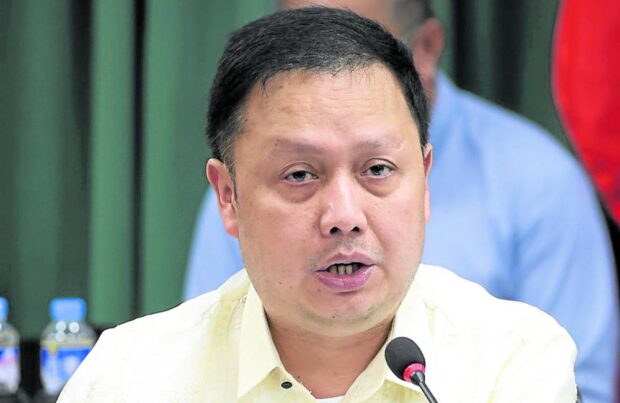
Ako Bicol party-list Rep. Elizaldy Co —Photo from his Facebook page
MANILA, Philippines — Citing the failure of concerned state agencies to capture high-profile fugitives, the House panel mainly in charge of allocating the national government budget now plans to “review” how the long-controversial intelligence funds are being used.
The chair of the House committee on appropriations cited three cases—that of televangelist Apollo Quiboloy, dismissed Bamban Mayor Alice Guo and former prisons chief Gerald Bantag—as he announced the plan on Saturday.
In a statement, Ako Bicol Rep. Elizaldy Co said that while these unsuccessful manhunts “might seem isolated, there’s a need to review how intel funds are being utilized.”
READ: Quiboloy still in PH, says DILG chief Abalos
Co led off by citing “the escape of former Mayor Alice Go despite the immigration lookout bulletin,” calling it “an incident of great concern” for the House.
READ: Gatchalian: BI knew Guo gone, kept Marcos in the dark
“Let’s include the cases of Kingdom of Jesus Christ founder Pastor Apollo Quiboloy and former (Bureau of Corrections) chief Gerald Bantag. These incidents are alarming because they raise serious questions on the use of funds for security and law enforcement,” he said.
“Every peso of intelligence funds must be utilized effectively. We want to prevent these lapses from happening again by ensuring stronger oversight and accountability,” Co said.
Contentious issue
The scrutiny of intelligence funds, and of a similar allocation known as confidential funds, has been a recurring source of contention during congressional budget deliberations, becoming increasingly intertwined with the political dynamics under the Marcos administration.
Intelligence funds are lump-sum allocations in the national budget earmarked for the military, police and other uniformed services whose prime functions include surveillance, information gathering and related operations in the interest of national security. Civilian departments or agencies—including the Office of the President—have also been granted their version of such allocations, called confidential funds.
OVP’s case
Due to the nature of their uses, the funds are not subject to standard auditing procedures and largely go unchecked. However, the norm was broken last year as the House looked into the budget of the Office of the Vice President (OVP).
Vice President Sara Duterte became the recipient of hefty confidential funds, until a falling-out with President Marcos led to an intense House scrutiny. In a hearing in September 2023, it was discovered that the OVP spent confidential funds worth P125 million in just 11 days in 2022.
In passing the 2024 budget, Congress denied the request of the OVP and the Department of Education—which at the time was headed also by Duterte in a concurrent capacity as secretary—for more confidential funds totaling P650 million. The amount instead went to agencies directly involved in national security or law enforcement.
Co did not specify the agencies whose intelligence funds would be reviewed by the House committee.
But currently drawing flak for Guo’s escape is the Bureau of Immigration (BI), while criticism over Quiboloy and Bantag remaining at large has been directed mainly at the Philippine National Police.
Guidelines
Under a set of guidelines issued in 2015, confidential and intelligence funds (CIFs) may not be used for salaries, wages, overtime, additional compensation, allowance, or other fringe benefits of government officials and employees.
They also may not be used for representation, consultancy fees, entertainment expenses, or the construction or acquisition of buildings or housing structures.
The guidelines allow their use only for the following: rental of transport vehicles related to confidential activities as well as rentals and incidental expenses related to the maintenance of safehouses; the purchase or rental of supplies, materials, and equipment for confidential operations that cannot be done through regular procedures; and the payment of rewards to informers, subject to conditions.
Confidential funds can also be used to uncover or prevent illegal activities that pose a clear and present danger to government personnel, property or other facilities under state protection, “as well as other uses that may be authorized by special laws such as the General Appropriations Act (GAA).”
Government agencies and government-owned and -controlled corporations (GOCCs) that are granted CIFs are required to submit quarterly accomplishment reports on the use of such funds no later than the 15th of the first month of the succeeding quarter.
According to the General Appropriations Act (GAA) for fiscal year 2024, the Philippine National Police received P906 million in intelligence expenses and has listed budget appropriations for activities which are “confidential in nature” amounting to P164.8 billion. The Armed Forces of the Philippines received P2.8 billion worth of funds for intelligence expenses. The Bureau of Immigration, on the other hand, received P20 million confidential funds.
For the total budget allocation of these agencies, according to GAA 2024, Philippine National Police received P197.9 billion, the Armed Forces of the Philippines received P229.3 billion, and the Bureau of Immigration received P4.4 billion. —with a report from Inquirer Research
Sources: gcg.gov.ph, dbm,gov.ph, elibrary.juidciary.gov.ph